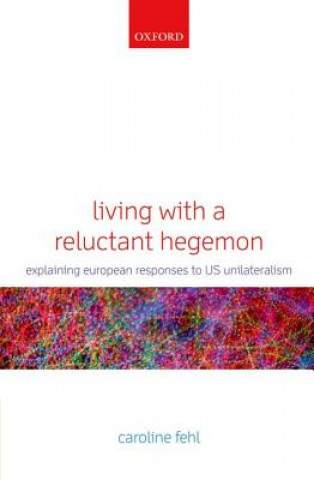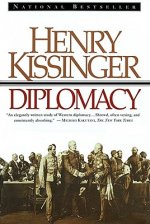
Kód: 01323772
Living with a Reluctant Hegemon
Autor Caroline Fehl
Living with a Reluctant Hegemon addresses a striking puzzle in contemporary world politics: why have European states responded in varying ways to recent unilateralist tendencies in US foreign policy? The United States played a he ... celý popis
- Jazyk:
 Angličtina
Angličtina - Vazba: Pevná
- Počet stran: 270
Nakladatelství: Oxford University Press, 2011
- Více informací o knize

Mohlo by se vám také líbit
-

Geologic Story of the Uinta Mountains
271 Kč -

Hammer of the Gods
462 Kč -

Theories of Federalism
3611 Kč -

Border Visions
3668 Kč -

Brass Instrument Manual
945 Kč -

Mass Media Research
7987 Kč -

Rockers and Rollers
303 Kč
Darujte tuto knihu ještě dnes
- Objednejte knihu a zvolte Zaslat jako dárek.
- Obratem obdržíte darovací poukaz na knihu, který můžete ihned předat obdarovanému.
- Knihu zašleme na adresu obdarovaného, o nic se nestaráte.
Více informací o knize Living with a Reluctant Hegemon
Nákupem získáte 413 bodů
 Anotace knihy
Anotace knihy
Living with a Reluctant Hegemon addresses a striking puzzle in contemporary world politics: why have European states responded in varying ways to recent unilateralist tendencies in US foreign policy? The United States played a hegemonic leadership role in building the post-war multilateral order but has been reluctant to embrace many recent multilateral treaty initiatives championed by its traditional European allies, such as the Kyoto Protocol on climate change, the International Criminal Court, or the verification protocol to the Biological Weapons Convention. European responses to US objections, however, have varied across these different transatlantic controversies. In some cases, European decision-makers watered down or abandoned contested treaties, whereas in other disputes, they opted for regime-building excluding the US, that is, for a strategy of non-hegemonic cooperation. How Europeans choose to deal with the 'reluctant hegemon' has critical implications for how key global challenges are addressed - and yet, the striking variation of their responses has been largely overlooked in a scholarly debate fixated on understanding US unilateralism. This book fills this important gap by studying European strategic choices in five recent transatlantic conflicts over multilateral agreements. It argues that neither realist accounts of global power dynamics nor rational institutionalist models of cooperation can fully explain why Europeans opt for non-hegemonic cooperation in some cases but not others. To resolve this puzzle, we need to combine rationalist propositions with constructivist insights about normative constraints on states' institutional choices. By developing such an integrated model, the book sheds new light on the long-standing theoretical debate about the relationship between hegemony and international cooperation.
 Parametry knihy
Parametry knihy
Zařazení knihy Knihy v angličtině Society & social sciences Politics & government International relations
4127 Kč
- Plný název: Living with a Reluctant Hegemon
- Autor: Caroline Fehl
- Jazyk:
 Angličtina
Angličtina - Vazba: Pevná
- Počet stran: 270
- EAN: 9780199608621
- ISBN: 0199608628
- ID: 01323772
- Nakladatelství: Oxford University Press
- Hmotnost: 566 g
- Rozměry: 161 × 241 × 21 mm
- Datum vydání: 20. October 2011
Oblíbené z jiného soudku
-

On Palestine
276 Kč -

Prisoners of Geography
276 Kč -

World Order
316 Kč -

International Relations, Global Edition
2702 Kč -

Grand Chessboard
566 Kč -

Diplomacy
462 Kč -

Clash of Civilizations and the Remaking of World Order
420 Kč -

Hundred-Year Marathon
389 Kč -

The Spy and the Traitor
306 Kč -

Understanding the Intelligence Cycle
1854 Kč -

Who Rules the World?
316 Kč -

Who Rules the World?
286 Kč -

Dead Aid
433 Kč -

World Order
358 Kč -

Adults In The Room
358 Kč -

Legacy of Ashes
441 Kč -

Evolution of Cooperation
474 Kč -

Strategic Vision
374 Kč -

Secret World
514 Kč -

Geopolitics and Geoculture
547 Kč -

Dawn of Eurasia
303 Kč -

How Spies Think
306 Kč -

Gaza in Crisis
303 Kč -

Planetary Cycles Mundane Astrology
480 Kč -

OVERTHROW : AMERICA'S CENTURY OF REGIME
509 Kč -

Is the EU Doomed?
616 Kč -

Righteous Victims
671 Kč -

Directorate S
430 Kč -

Europe's Border Crisis
1121 Kč -

America's Strategy in World Politics
1749 Kč -

Destroying Libya and World Order
480 Kč -

My Nationalist Pony
871 Kč -

Critical Practices in International Theory
5172 Kč -

American Century and Beyond
474 Kč -

Heroic Failure
286 Kč -

Oxford Handbook of the European Union
1429 Kč -

Rise and Kill First
462 Kč -

PEACE TO END ALL PEACE
488 Kč -

Tragedy of Great Power Politics
462 Kč -

Countdown to Zero Day
384 Kč -

Revenge of Geography
418 Kč -

Political Order and Political Decay
420 Kč -

Naked Diplomat
357 Kč -

Against Our Better Judgment
311 Kč -

After the Empire
360 Kč -

Legacy of Ashes
645 Kč -

Dragons and the Snakes
794 Kč -

Oxford IB Diploma Programme: Global Politics Course Book
1456 Kč -

Emergency Sex (And Other Desperate Measures)
407 Kč
Osobní odběr Praha, Brno a 12903 dalších
Copyright ©2008-24 nejlevnejsi-knihy.cz Všechna práva vyhrazenaSoukromíCookies



 Vrácení do měsíce
Vrácení do měsíce 571 999 099 (8-15.30h)
571 999 099 (8-15.30h)